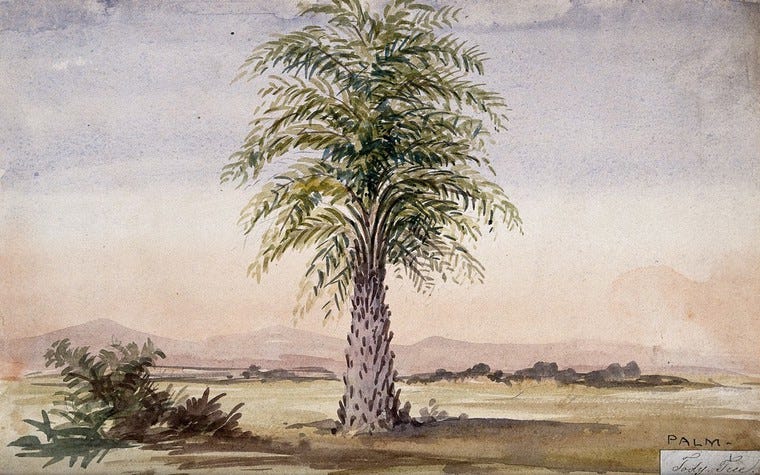O my palm tree!
One of the greatest love poets in the English language looks to trees for inspiration.
from Elizabeth Barrett Browning, Sonnets from the Portuguese
I think of thee!—my thoughts do twine and bud About thee, as wild vines, about a tree, Put out broad leaves, and soon there’s nought to see Except the straggling green which hides the wood. Yet, O my palm-tree, be it understood I will not have my thoughts instead of thee Who art dearer, better! Rather, instantly Renew thy presence; as a strong tree should, Rustle thy boughs and set thy trunk all bare, And let these bands of greenery which insphere thee, Drop heavily down,—burst, shattered everywhere! Because, in this deep joy to see and hear thee And breathe within thy shadow a new air, I do not think of thee—I am too near thee.

What we love about this passage…
The sonnet intertwines love, absence, and reunion in a brisk 14 lines. Images of trees and greenery are used to explain the pangs the speaker feels for her lover; he himself is pictured as a palm tree wrapped in the vines of her thoughts. Perhaps this is a way for the speaker to defend these declarations of her own passionate feelings. If they are as natural as the growth of plants, why should they be hidden away and kept private?
About the Author
Elizabeth Barrett Browning (1806-61) was educated mostly at home, and was a voracious reader largely confined to the house by chronic illness. She became a successful poet and attracted the admiration of Robert Browning, whom she eventually married. They lived in Italy for her health, and she avidly followed Italian politics until her death.
Browning’s poetic subjects encompass women’s rights, children, the chronically ill, and the enslaved and oppressed—her compassion for suffering is, truly, boundless and immeasurable. One of her most remarkable achievements is her long narrative poem Aurora Leigh (1857), autobiographical in nature and frankly depicting many of the social problems of the age, including the deplorable treatment of ‘fallen women,’ the poverty of the working class, and the lack of professional opportunities for women. Her poetry deeply influenced the American poet Emily Dickinson as well as many other writers.
To Read Alongside…
…our past newsletters on Elizabeth Barrett Browning and a recent newsletter on Emily Dickinson.
You might also enjoy the way trees figure as rich metaphors in two prose works by women: the pear tree in Katherine Mansfield’s story ‘Bliss,’ and the fig tree in Sylvia Plath’s The Bell Jar.
Suggest a LitHit!
Tell us your own favourites from literature you've read, and we can feature you as a Guest Curator if you like. Just email us with the following information:
Your full name
The title of the book you're suggesting
The location of the excerpt within the book (e.g., "in the middle of chapter 5"), or the excerpt itself copied into the email or attached to it (in Word)
Why you love it, in just a few sentences
About LitHits
LitHits helps you make time for reading by bringing you unabridged excerpts from brilliant literature that you can read on the go, anytime or any place. Our curators carefully select and frame each excerpt so that you can dive right in. We are more than a book recommendation site: we connect you with a powerful, enduring piece of literature, served directly to your mobile phone, tablet or computer.
Today's guest curator...
Dr Daniel Abdalla is a core member of LitHits and an expert in nineteenth and twentieth-century literature, particularly its relationship to science.
You might also enjoy...
Feedback
We'd love to hear your thoughts on our newsletter:
kshepherdb@yahoo.co.uk
Graphic design by Sara Azmy
All curation content © 2024 LitHits. All rights reserved.



